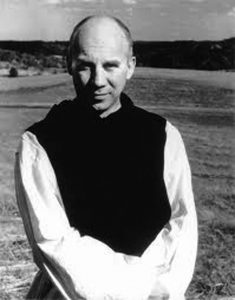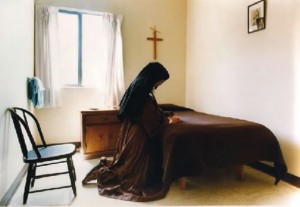Bedroom Prayer
“But when you pray, go to your private room, shut yourself in, and so pray to your Father who is in that secret place...” Matt 6:6
Our eldest granddaughter is of an age where she is beginning to discover that she is a little person in her own right. As she weans herself off her mother she show signs of wanting to have little friendships from which she tries to exclude our daughter. This sort of growth as an individual is a wonder to behold. In children it is also humorous.
When I visited recently she said, “Jones, come up to my jebroom, (bedroom).” So off we went hand in hand to her little private piece of the house. When we got there she did not have a clue what to do with me. She made for the bookcase and proceeded to splay her books onto the floor. Having done that she opened the drawers and emptied them of her clothes. Then she turned her attention to the bed and climbing upon it introduced me to her toys for which she had more regard than her clothes and books.
Goofy behaviour can be an indication that a person is awakening to another stage of development. It is at its most observable in teenage boys when they wean themselves off their mothers and start to notice teenage girls. Pondering my jebroom experience made me think that awakening to an adult, prayerful friendship with God can cause a person to do some goofy things.
When we move from the prayer of our public Church life to the prayer of the bedroom, from the formulas of childhood to a search for truth through meditative prayer, we can feel lost and behave oddly. It is as if we have been prompted by the Holy Spirit to move on, gone into our rooms, encountered God there but have not a clue what to do next.
Bedroom prayer is prayer that does not have an official and public face though it is part of the prayer of the Church. This meditative prayer can become a way in which we discover who we are before God and how we fit into God’s plan for humanity. Weaning ourselves off Mother Church and awakening to the world is not cutting our baptismal cord, just strengthening the bonds of love between heaven and earth.
To meditate well we need the simplicity of a child which Thomas Merton says “we all unfortunately lose before we have a chance to make good use of it.” As full- blown adults we assume a level of control over our lives that avoids occasions where we may be caught out like a child not knowing how to behave. That is a shame because the innocence, trust and goofiness of childhood are indications in the adult of Love waking up within us.
Merton says, “Meditation is serious reflection… which involves not only the mind but also the heart, and indeed our whole being.” The desire to meditate in a way “which aims at bringing our whole being into communication with an ultimate reality beyond and above ourselves” is a gift that comes from God through grace. As we know grace builds on nature, so if we are already worshipping God in the liturgy and offering up our little prayers of petition or saying the rosary this gift will come to us. The Holy Spirit will lead us to our private place to encounter God in a more personal relationship and all this will seem quite natural.
“Meditation has no point unless it is rooted in life.” The call of the laity to holiness means that we are called to meditate in a way that is rooted in lay life. For many that will be married, family life. Perhaps for the most part the usual path of holiness will be through the public prayer of the Church, ie. liturgy and the life that goes on around it. Others will feel a deeper, nagging hunger for truth that is not satisfied with these things and be compelled to use private prayer as a sort of search machine.
When we go to our room to meditate we need to recollect ourselves. I remember when I was a child my mother and her friends used to go off once a year to Days of Recollection. So this recollection is nothing new in the Church but Vatican II asked the laity to be a bit more responsible as individuals in making it happen in everyday life. We need to pay attention to God, to be attentive to God so that we can be open to God.
What we basically do in bedroom prayer is think about God. This thinking way of praying obviously is different from the sort of thinking we do during religious study. Bedroom prayer aims to get us thinking about God and life in general so that we might be better persons, not more educated members of the laity. During meditation we use our heads primarily, but bedroom prayer demands involvement of the heart. “One who really meditates does not merely think, he also loves.” Here is the challenge of private prayer: to go forth from the bedroom and be a more loving person in the world.
Bedroom prayer can be done almost anywhere. Meditation requires us to be comfortable in our surroundings. I suppose one of the reasons people sit in the same pews Sunday after Sunday is one manifestation of this sort of comfort. Building on that we might choose a spot to which we can go easily, without too much thought. Somewhere private and quiet is good. For many, especially mothers, finding such a place may be virtually impossible. I used to sit on my bed when the children had gone to school. I loved the contrast between the pre-school rush and the settled peace of an empty house. Perhaps after children have gone to bed could work for some. My husband tells me he prays this way when he is fishing. As with anything worthwhile in life some effort is required.
After a period of settling down and prayerful recollection we may choose to meditate on a passage of scripture, particularly one from the New Testament. The daily Mass readings are a good place to start. There are plenty of books to help us make our time of meditation fruitful and daily reflections such as the ones in this monthly publication can be of help. Meditating on the Gospels causes us to reflect on our own lives, experiences and difficulties. As we reflect on the life of Jesus Christ in the chosen text, his presence in own lives should become apparent in new and challenging ways.
The late John Kelly ocso has written extensively in this publication about prayer and meditation as a personal journey. He told me once that nobody much talks about love these days. He did. Ultimately, prayer, meditation and contemplation are about love. It is love that weans fruitfully, that admires goofy behaviour, and satisfies the hunger for truth.




 Entries(RSS)
Entries(RSS)